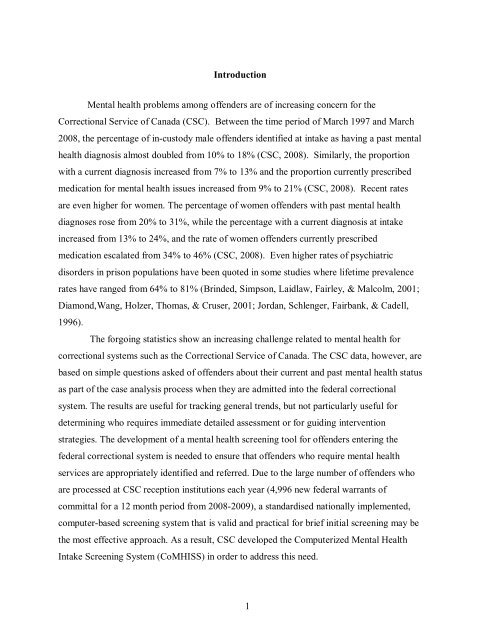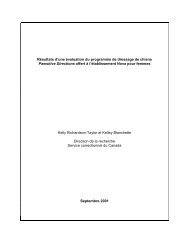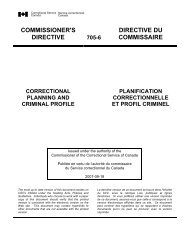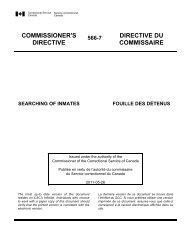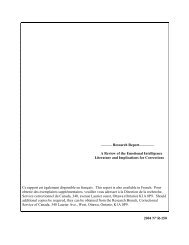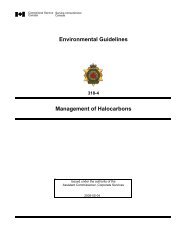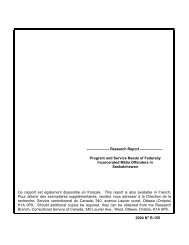The Brief Symptom Inventory (BSI) - Service correctionnel du Canada
The Brief Symptom Inventory (BSI) - Service correctionnel du Canada
The Brief Symptom Inventory (BSI) - Service correctionnel du Canada
Create successful ePaper yourself
Turn your PDF publications into a flip-book with our unique Google optimized e-Paper software.
Intro<strong>du</strong>ction<br />
Mental health problems among offenders are of increasing concern for the<br />
Correctional <strong>Service</strong> of <strong>Canada</strong> (CSC). Between the time period of March 1997 and March<br />
2008, the percentage of in-custody male offenders identified at intake as having a past mental<br />
health diagnosis almost doubled from 10% to 18% (CSC, 2008). Similarly, the proportion<br />
with a current diagnosis increased from 7% to 13% and the proportion currently prescribed<br />
medication for mental health issues increased from 9% to 21% (CSC, 2008). Recent rates<br />
are even higher for women. <strong>The</strong> percentage of women offenders with past mental health<br />
diagnoses rose from 20% to 31%, while the percentage with a current diagnosis at intake<br />
increased from 13% to 24%, and the rate of women offenders currently prescribed<br />
medication escalated from 34% to 46% (CSC, 2008). Even higher rates of psychiatric<br />
disorders in prison populations have been quoted in some studies where lifetime prevalence<br />
rates have ranged from 64% to 81% (Brinded, Simpson, Laidlaw, Fairley, & Malcolm, 2001;<br />
Diamond,Wang, Holzer, Thomas, & Cruser, 2001; Jordan, Schlenger, Fairbank, & Cadell,<br />
1996).<br />
<strong>The</strong> forgoing statistics show an increasing challenge related to mental health for<br />
correctional systems such as the Correctional <strong>Service</strong> of <strong>Canada</strong>. <strong>The</strong> CSC data, however, are<br />
based on simple questions asked of offenders about their current and past mental health status<br />
as part of the case analysis process when they are admitted into the federal correctional<br />
system. <strong>The</strong> results are useful for tracking general trends, but not particularly useful for<br />
determining who requires immediate detailed assessment or for guiding intervention<br />
strategies. <strong>The</strong> development of a mental health screening tool for offenders entering the<br />
federal correctional system is needed to ensure that offenders who require mental health<br />
services are appropriately identified and referred. Due to the large number of offenders who<br />
are processed at CSC reception institutions each year (4,996 new federal warrants of<br />
committal for a 12 month period from 2008-2009), a standardised nationally implemented,<br />
computer-based screening system that is valid and practical for brief initial screening may be<br />
the most effective approach. As a result, CSC developed the Computerized Mental Health<br />
Intake Screening System (CoMHISS) in order to address this need.<br />
1


